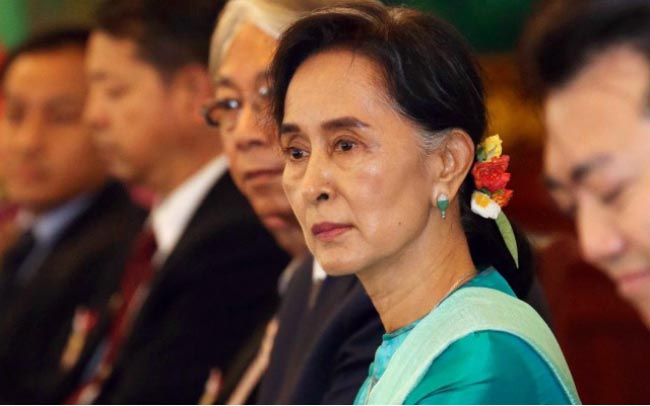In 1991, Aung San Suu Kyi was known as the Nobel laureate in Norway but received the Nobel Prize after 21 years in Oslo since she was under house arrest. Being released from the house arrest and honored to get the Nobel Peace Prize, Aung San Suu Kyi entered politics to work for democratization and the protection of ethnic minority group. She ran for presidency and undertook the leadership of Myanmar (Burma) after the victory. Her victory came as the rights of minority groups, particularly the ethnic minority of Rohingya Muslims, were violated flagrantly and rape, murder and forced escape, which signal genocide, were imposed on them systematically. With the start of recent violence against the ethnic minority of Rohingyas, more than 3,500 people were reportedly killed and 340,000 others were forced to flee to neighboring countries, especially India and Bangladesh. According to reputable media, the Myanmar army forces have planted mines so as to bar them from return. Based on national and international reports, reputable documents, and international evidence, one can claim that Aung San Suu Kyi is the Peace Laureate of genocide. To prove this fact, let us view the state of Rohingya Muslims under her leadership.
The ethnic minority Rohingya Muslims has racial and cultural root in the state of Arak (Rakhine) Myanmar. Based on the reputable evidence, Rohingya Muslims were in the state of Rakhine before the independence of Myanmar in 1948 and even before being under the colony of England. Notwithstanding this fact, the radical Buddhists and Myanmar former and present administrations denied it and called Rohingya Muslims as illegal immigrants claiming that they took refuge to Myanmar from 1947 to 1948 after the separation of Bangladesh from Pakistan. The population of Rohingya Muslims was controversial and estimated from two to six million. Rohingya Muslims, which form 4 percent population of Myanmar, reside Rakhine located in Myanmar west coast.
Rakhine is one of the most underprivileged states in Myanmar and most often Rohingya Muslims live in camps and are not allowed to travel out of Rakhine without the permission of central government. The Rohingya people are Sunni Muslims and follow Sufism. The United Nations and many international media and human rights organizations describe the Rohingya Muslims as “the world’s most persecuted minority”. The army forces took the power in 1962 through a coup in this country. All citizens were supposed to have national identity card; however, Rohingya people were given only identity card which introduced them foreigners and curtailed their opportunity for work and education. The new citizenship law in 1982 made this situation more horrific and Rohingyas were not even recognized among the 135 Myanmar ethnic groups – this issue continued up to now worse than ever before. Within the last eight decades, Rohingyas suffered atrocities and barbarity as scores of them were killed annually. In 1960s, more than 20000 Muslims were killed in the wake of violent acts of Myanmar security forces. Following such crimes, 200 Muslims fled Myanmar for Bangladesh in 1992.
To describe the state of Rohingya Muslims from legal perspective, one needs to view article 2 of Convention on the Prevention and Punishment of the Crime of Genocide which was adopted by the UN General Assembly on 9 December 1948 and article 6 of Statute of the International Criminal Court adopted in 17 July 1998 both of which pertain to genocide.
Article 2 of the Convention defines genocide as following:
In the present Convention, genocide means any of the following acts committed with intent to destroy, in whole or in part, a national, ethnical, racial or religious group, as such: (a) Killing members of the group; (b) Causing serious bodily or mental harm to members of the group; (c) Deliberately inflicting on the group conditions of life calculated to bring about its physical destruction in whole or in part; (d) Imposing measures intended to prevent births within the group; (e) Forcibly transferring children of the group to another group.
Statute of the ICC defines genocide as: For the purpose of this Statute, “genocide” means any of the following acts committed with intent to destroy, in whole or in part, a national, ethnical, racial or religious group, as such: (a) Killing members of the group; (b) Causing serious bodily or mental harm to members of the group; (c) Deliberately inflicting on the group conditions of life calculated to bring about its physical destruction in whole or in part; (d) Imposing measures intended to prevent births within the group; (e) Forcibly transferring children of the group to another group.
Nicholas Kristof, the New York Time columnist, writes in a commentary titled “A Noble Peace Prize Winner’s Shame” as, “Aung San Suu Kyi, a beloved Nobel Peace Prize winner, is presiding over an ethnic cleansing in which villages are burned, women raped and children butchered.” He adds, “She genuinely believes that they are outsiders and troublemakers. But in addition, the moral giant has become a pragmatic politician — and she knows that any sympathy for the Rohingya would be disastrous politically for her party in a country deeply hostile to its Muslim minority.”
One will conclude that the killing of Rohingya Muslims is defined as genocide based on article 6 of the Statute of ICC, article 2 of Convention on the Prevention and Punishment of the Crime of Genocide, and international media. Hence, it does not matter either the victim of genocide is one person or more belonging to a certain national, racial, ethnic or religious group or killed “in whole or in part”. Hence, the recent crimes of Myanmar government is the epitome of genocide and the systematic ethnic cleansing is going on as one can strongly claim that Aung San Suu Kyi is the Peace Laureate of genocide.
Home » Opinion » Aung San Suu Kyi – The Nobel Laureate of Genocide
Aung San Suu Kyi – The Nobel Laureate of Genocide
| Darab Ali Aliyar

